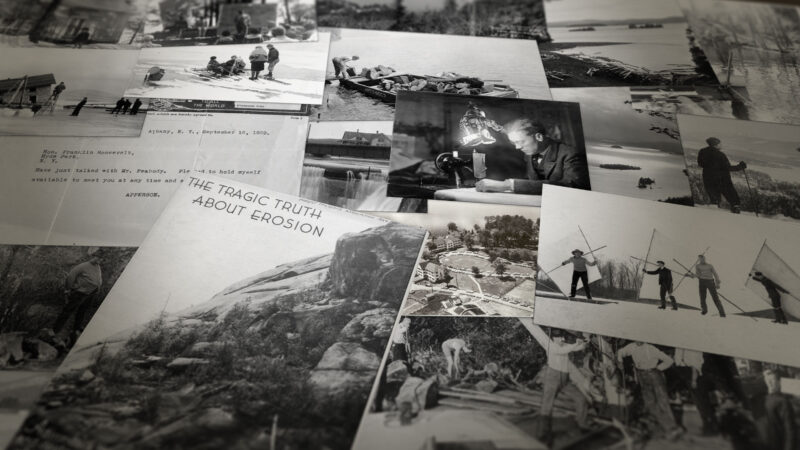- March, 1945 – Complete Report of the New York State Joint Legislative Committee on Lake George Water Conditions
…much more unfortunate has been the attitude of J. S. Apperson, president of The Forest Preserve Association of New York State, Inc. Being advised that Mr. Apperson was interested in the Lake George water level problem and had some ideas relating to the matter, the chairman of this committee not only sent him a copy of the notice of the time and place of the hearings, but wrote personal letters inviting Mr. Apperson to attend. Mr. Apperson did not respond to the invitation, but instead he circularized the members of the committee by sending them prior to the date of the hearings a pamphlet entitled “Lake George a Mill Pond,” This is the pamphlet which was introduced in evidence by Dr. Melish. In view of the contents of this pamphlet the committee felt that Mr. Apperson’s attendance was imperative. Accordingly when he failed to appear the chairman issued a subpoena, but Mr. Apperson could not be found either at his place of residence in Schenectady, or at his office at the General Electric Company, or at his cottage on Lake George. A letter from his attorney to the chairman of the committee made it evident that Mr. Apperson knew that he was being sought.
The individual authorship of the pictures and statements in these two pamphlets is not revealed, but J. S. Apperson is president of the Forest Preserve Association which issued them, and Dr. Stanton, one of its organizers, stated in a letter to W. B. Woodbury that “The Forest Preserve Association of NY State is about 70% Apperson.”
In addition to Mr. Apperson and the four persons already named there are two others who joined them as plaintiffs-interveners in the suit mentioned above (p.161). They are Kenneth G. Reynolds and M.F. Witherell. These seven individuals are frequently referred to as the “Apperson group.” …They arrogate to themselves the virtue of being the only persons “deeply concerned” about Lake George water levels and qualified to “Make this problem their immediate task.” And yet, when the Legislature of the State of New York appoints a committee to make a “thorough investigation and study” of the subject, some of them fail or refuse to attend its public hearings and none of them offers a single constructive suggestion. If they really believe that the problem can be solved by destroying the natural dam, and if they possess pertinent data not known to the engineers, it was their duty to present such date to this committee. That was their “immediate task.”
…But it is the leader himself who merits the chief rebuke. It is not so much because of his presumptuousness in circularizing the committee with what purported to be printed evidence in advance of the hearing, nor the misleading character of that evidence, nor the sorry spectacle of his contemptuousness of his attitude towards a duly authorized agency of the State Legislature: it is rather that one who sought to impress the committee of his supreme interest in Lake George and his full knowledge of its problems should not have recognized his obligation to come in person and to state the facts and his views in public under oath.
